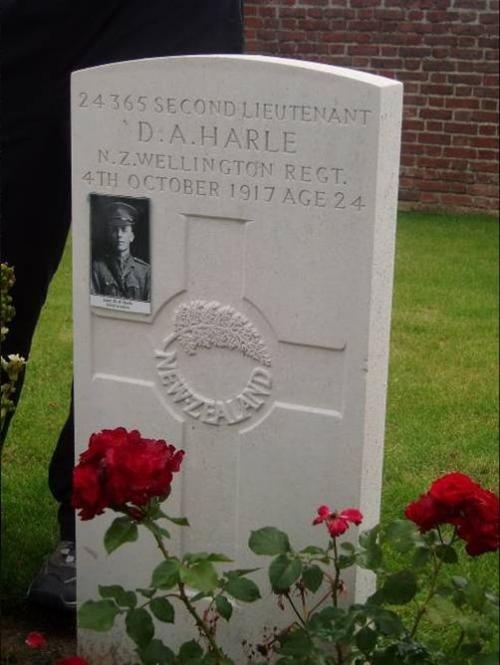
A fine scholar and sportsman, Douglas (Dougie) Harle was one of Wellington College's outstanding pupils in the years immediately before the war. Harle, a 24-year-old second lieutenant in the Canterbury Infantry Regiment, was killed during the successful attack on Gravenstafel Spur on 4 October 1917. A fellow officer reported that he showed ‘great dash and initiative’ in leading his men against an enemy machine-gun post in a farm building. He was killed ‘just as the position was practically taken'. Harle was buried in the Dochy Farm Cemetery. The surrounding landscape today is a far cry from the wasteland of 1917. Back then it was a sea of mud, pock-marked by shell holes that quickly filled with water and became graves for many men.
His school reports highlight a young man of outstanding character: prefect, top scholar, talented gymnast and lightweight boxing champion; in 1911 he was school dux. Harle completed a law degree at Victoria University College before being accepted for military service, at the second attempt, in early 1916. He was commissioned as an officer.
Shortly before the Battle of Passchendaele, Harle and two old school friends, Norman Shrimpton and Ken Luke, went on leave to Boulogne. For many New Zealanders, the war was a great adventure. The very real possibility of being killed or maimed was often pushed to the back of the mind as these young men lapped up their first taste of overseas travel. The opportunity to visit places such as Boulogne, with its famous port and Roman-walled old town, was one of the reasons these old school friends had enlisted in the first place. The food, wine, sights and smells would have been a welcome diversion for young men who were about to participate in what has been described as New Zealand’s greatest disaster.
Ken Luke was the only one of the three friends to survive the war. Norman Shrimpton was killed in 1918 and is also buried in Belgium. Luke returned to Wellington and became city engineer. He was responsible for designing and building the iconic Wellington landmark, the band rotunda at Oriental Bay.

Community contributions